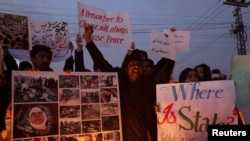ISLAMABAD —
Pakistan’s prime minister has dismissed the political administration of southwestern Baluchistan province, in response to the demands of protesters angry about deadly violence aimed at minority Shi'ite Muslims, including a bomb attack last Thursday that killed nearly 100 people.
Prime Minister Raja Pervez Ashraf flew to the provincial capital, Quetta, and met late Sunday with Shi'ite families who were standing watch over dozens of coffins holding the remains of their relatives killed in Thursday’s twin bombings.
The protesters, members of the Shi'ite Hazara community, were refusing to bury their dead unless the provincial government was dismissed and the army empowered to take control of the city.
Shortly after his meeting with Shiite leaders in Quetta, Prime Minister Ashraf announced in a televised speech early Monday that he was dismissing Baluchistan's chief minister and his political administration.
After prolonged consultations with leaders of all major political parties, the prime minister said, Pakistan's federal government is using its constitutional powers to take control of the province. He told his nation that paramilitary forces have been given police powers, and promised they will launch operations against outlawed militant organizations behind the sectarian attacks.
Shortly after Ashraf's announcement, the Shi'ite protesters in Quetta called off their action and said they would now agree to bury the victims of the bombings.
Deceased in an Islamic society are normally buried within hours of death, so the three-day standoff in Quetta was a dramatic and deeply symbolic gesture - one that observers said emphasized years of suffering by Hazaras in Baluchistan.
Zohra Yusuf is chairperson of the independent Human Rights Commission of Pakistan.
“It is certainly unprecedented. I think the Hazara community has shown tremendous patience. There have been many attacks on them in the past many years. They have been targeted primarily on the basis of their faith. And the [provincial] government has totally failed in its responsibility to provide protection to them," she said.
Sectarian violence killed more than 400 people in Pakistan last year, including around 150 members of the Hazara community in Quetta. The outlawed Sunni militant group Lashkar-e-Jhangvi claimed responsibility for Thursday’s bombing. The group has been blamed for previous assaults on Shi'ites, and is allied with Pakistani Taliban and al-Qaida operatives who have been at war with the federal government in Islamabad.
Authorities blamed the insurgents for Sunday’s roadside bombing in a northwestern tribal region that killed more than a dozen soldiers and wounded many others. The mountainous North Waziristan territory borders Afghanistan and is believed to be a stronghold of anti-Pakistan insurgents.
Prime Minister Raja Pervez Ashraf flew to the provincial capital, Quetta, and met late Sunday with Shi'ite families who were standing watch over dozens of coffins holding the remains of their relatives killed in Thursday’s twin bombings.
The protesters, members of the Shi'ite Hazara community, were refusing to bury their dead unless the provincial government was dismissed and the army empowered to take control of the city.
Shortly after his meeting with Shiite leaders in Quetta, Prime Minister Ashraf announced in a televised speech early Monday that he was dismissing Baluchistan's chief minister and his political administration.
After prolonged consultations with leaders of all major political parties, the prime minister said, Pakistan's federal government is using its constitutional powers to take control of the province. He told his nation that paramilitary forces have been given police powers, and promised they will launch operations against outlawed militant organizations behind the sectarian attacks.
Shortly after Ashraf's announcement, the Shi'ite protesters in Quetta called off their action and said they would now agree to bury the victims of the bombings.
Deceased in an Islamic society are normally buried within hours of death, so the three-day standoff in Quetta was a dramatic and deeply symbolic gesture - one that observers said emphasized years of suffering by Hazaras in Baluchistan.
Zohra Yusuf is chairperson of the independent Human Rights Commission of Pakistan.
“It is certainly unprecedented. I think the Hazara community has shown tremendous patience. There have been many attacks on them in the past many years. They have been targeted primarily on the basis of their faith. And the [provincial] government has totally failed in its responsibility to provide protection to them," she said.
Sectarian violence killed more than 400 people in Pakistan last year, including around 150 members of the Hazara community in Quetta. The outlawed Sunni militant group Lashkar-e-Jhangvi claimed responsibility for Thursday’s bombing. The group has been blamed for previous assaults on Shi'ites, and is allied with Pakistani Taliban and al-Qaida operatives who have been at war with the federal government in Islamabad.
Authorities blamed the insurgents for Sunday’s roadside bombing in a northwestern tribal region that killed more than a dozen soldiers and wounded many others. The mountainous North Waziristan territory borders Afghanistan and is believed to be a stronghold of anti-Pakistan insurgents.




